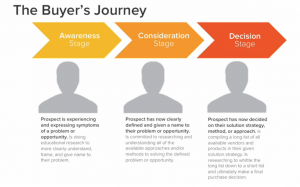Marketing. For many business owners, it’s a frightening topic. Let’s face it: it’s a complicated world out there and marketing is getting more and more complex by the minute. So what are the biggest marketing challenges facing business owners today, and what can you do about them?
 Challenge #1: Knowing what marketing is and why it matters
Challenge #1: Knowing what marketing is and why it matters
Many business owners have heard of marketing and many know what it means. However, marketing challenges often start at the beginning: there are just as many business owners and executives who don’t know what marketing is, don’t know why it matters, and thus, aren’t willing to invest in it.
What marketing is:
Marketing is, in essence, a big toolbox that brings clients and customers to your doorstep. It’s how you tell people what you do, who you do it for, how you do it, and what sets you apart from similar businesses.
I believe the argument could be made that marketing encompasses everything from the decision about who your target market is and what you’re going to offer them to the time extending past the point where someone has made a purchase and you’ve delivered on your promises. It’s a process, simply because everything you do in the areas of sales and customer service, for example, impact a customer’s decision with respect to whether s/he is going to do business with you again.
Why business owners think it doesn’t matter:
Many business owners are unaware of the utility and efficiency of marketing and why it can be so impactful for a business. In fact, I’ve talked with business execs who have said, “We’re at the top of our game in [insert city name here]. We don’t need marketing.” And I always laugh when I hear someone say that, because I know they won’t be at the top of the game for long. Marketing is the thing that keeps you at the top…or marketing is what will help another business beat you because you thought you didn’t need marketing.
The Solution:
Learn why marketing matters:
One of the best things about marketing is that is is the height of efficiency. That is, once you put a marketing campaign into place, it can work for you while you’re doing other things. This is one of the big misunderstandings about marketing – that it must take a lot of time. In fact, there are many tools in the marketing toolbox that a business can employ to grow the business without a huge expenditure of time or money.
Challenge #2: Justifying the expenditure on marketing
It’s tough for small businesses to justify the expenditure on marketing when they don’t fully appreciate the value marketing can bring. Further, when there are so many options out there and so many salespeople (and yes, con men/women) trying to peddle the latest “magic beans” in marketing, it can be a daunting task to know what will actually be of benefit to your business.
The Solution:
Focus on the value that marketing can bring. If you know that marketing can be effective and impactful for your business, then you’ll be more open to accepting that investing in marketing is a good idea. Think about it this way: the right marketing strategies should bring in enough new business that they pay for themselves- multiplied. So if you add new marketing strategies that bring in new business, then you’ll cover the expense of the new strategies and have more money coming in beyond that.
That said, if one of the reasons you can’t justify spending on marketing is because you don’t know where to spend, then keep reading!
Challenge #3: Knowing who you’re actually trying to reach
It’s best to start by knowing who you’re actually trying to reach. More often than not, when I start working with a business, I quickly discover that they simply don’t know who their target market is. They think they do, but…they don’t. The target market definition is almost always too vague.
The Solution:
If you can’t picture who your client is with absolute clarity, you need to work on your target market definition. Start working on the details – who is the ideal buyer for your products or services? What does this person look like? Where do they spend their time and how do they spend it? What do they like, not like, and most importantly, where do they look for businesses like yours? Gaining clarity with your target market definition is key to creating a clear path for your business.
Challenge #4: Understanding just what marketing tasks are important
Today, it’s almost impossible for anyone to keep up with marketing, especially if you’re trying to do it all. A one-person marketing team (worse, a one-person business) will almost always struggle, simply because there are way too many things to do for anyone to do it all.
The Solution:
If you know who your target market is, then you should know them well enough to know where they spend time and where they’re looking for products and services like yours. So that should help you to narrow down your marketing choices. You don’t have to be on every social media platform, for example. You just have to be where your prospective clients and customers are most likely to be.
Challenge #5: Planning how to spend marketing dollars and time
Once you’ve decided to actually invest in marketing, how do you know where to spend that time and money? There are so many tools and strategies out there, how do you know how to come up with a winning combination? Sometimes the biggest marketing challenge businesses face is just knowing how to develop a sound marketing campaign.
The Solution:
Part of this issue should be resolved once you handle Challenges #3 and #4 and know who you’re reaching and where they spend time looking for you. But even then, the list of marketing tools you could employ may still be too long for you and/or your marketing team to handle. Now it’s time to look at where you’ll get the most bang for your buck.
I typically start out by recommending strategies that are known to be reliable in a particular industry for my clients who are just starting out or have smaller staffing, and then when they get those strategies under their belts and systematized, they may be ready to move on to more advanced or experimental techniques.
Sometimes in marketing you do have to experiment. My executives love hearing this, by the way. But the fact is, if you don’t have the data, you don’t know how well something’s going to work. So we occasionally throw something on the wall and see what sticks. I actually do think it makes a good amount of sense to include an “experimental” category in a marketing budget, simply because I know there are times when new strategies come up and you need to know if they’ll be of benefit to you. But you don’t want to pull that money from an existing strategy that is working, just for an experiment, so it’s more effective to have a little capital earmarked for experimentation.
If you don’t know where to start with any of these things, though, it may make sense to bring in a trusted marketing expert as a resource to provide wisdom and guidance (and possibly training) in terms of planning out your marketing dollars so that you do get the most bang for your buck. Sometimes bringing in the right consultant can make all the difference between spending too much and getting little in return and spending a reasonable amount and getting a huge return.
Marketing itself is a challenge for most small businesses. In fact, many business owners can’t even bring themselves think about marketing, simply because “marketing” and figuring out exactly what that means is just too much to handle. Literally 75% of businesses today are solo-owned and operated, so the vast majority of business owners are unable to take a higher level perspective because they’re focusing on the details.
You know you face marketing challenges. Theoretically, knowing the solutions and knowing you’re not alone will help you begin to address them.
Business & Finance Articles on Business 2 Community
(396)
Report Post







